
Chris Livingston: A Space Game Resurgence
I know there have always been space games on PC, but it feels like the genre has gotten a fresh solid booster launch this year. Just look at the excitement for the space games that aren't even out yet: there's been so much interest in Star Citizen that it hasn't stopped making money all year, and No Man's Sky caused us conniptions when we didn't know for sure it would come to PC (it will). As for the games we can actually get our hands on, Elite: Dangerous was recently released, while the adorably challenging Kerbal Space Program just hit beta.
We've seen the beginnings of lovely in-the-works space exploration game Rodina, and Starpoint Gemini 2 rocketed through early access for a proper splashdown on Steam. Even some ancient favorites have gotten a second orbit this year, thanks to X-Wing and TIE Fighter relaunching on GOG.com for a new generation of fans (and us nostalgia-ridden old farts). With actual space-based excitements like the Rosetta comet mission and the test-launch of Orion, 2014 was a great year for the space race, both in life and on PC.
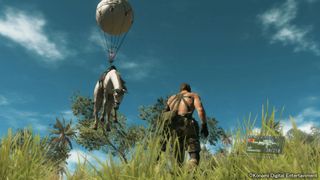
Andy Kelly: Metal Gear Solid comes back to PC
“Kept you waiting, huh?” says Big Boss at the beginning of MGS V: Ground Zeroes, almost as if Hideo Kojima is talking through him. Yeah, you bloody did. But I forgive you, because what a comeback. Ground Zeroes might be the hors d'oeuvre to The Phantom Pain’s kingly feast, but it’s a brilliant taster of the series’ new open-world stealth.
Kojima is, often, in dire need of an editor, and someone to put their hand on his shoulder and go “Woah, there.” But, at the same time, it’s this ability to do whatever he wants that makes his games so great. What other developer would devote time and resources to putting real-time melting ice cubes in a game, as he did in Metal Gear Solid 2? I expect, and hope for, similar forays into the realm of the absurd in MGS V.
I was concerned that, after a spate of dodgy ports of Japanese games, that Ground Zeroes would run badly on PC. But the Fox engine, developed in-house at Kojima Productions, works perfectly. Running around a rain-soaked Camp Omega at 60fps was a real treat.
The Phantom Pain is sounding really promising, especially the Dark Souls-esque multiplayer mode that lets you create your own base (essentially a level), then challenge friends to infiltrate it—stepping in to help your army if necessary. I’m surprised more people aren’t talking about this, ‘cause it has the potential to be brilliant. Mostly, though, I’m just glad Kojima is making games for PC again, because—despite his many flaws—he’s still my favourite game dev. A genuine auteur who seems to second-guess you at every turn.
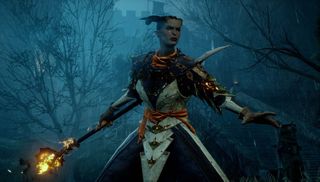
Tyler Wilde: Life as the Inquisitor
Dragon Age: Inquisition sure is dumb and buggy and great. I can criticize it to death. The keyboard and mouse controls suck. The inventory system is just miserable. The combat—at least as an archer—is only passably entertaining. One time my entire party stood on top of a merchant's cart and walked back and forth bumping into each other until I moved. And a lot of the sidequests would be dull as picking elfroot (and may actually involve picking elfroot) if the world weren't intrinsically fun to explore. But it is. It’s huge and gorgeous and storied. And the characters are fun to listen to (as long as their banter actually plays). And so even though the ‘save the world’ plot should consider a job as a 15-year-old anime series, I bought in and read all the lore and talked to every character as much as I could, and I’m really thankful for the escape.
A good book or game of this variety is a sort of virtual reality, where all the external stuff—words and images—is just the circuitry that coaxes me into a hallucination. If it’s good enough, I can forgive all the little glitches and pretend the lack of fidelity (who sprints around checking to see if their friends have anything new to say?) doesn’t exist to maintain that illusion. Dragon Age: Inquisition is good enough. Iron Bull’s quips, Sera’s smarmy schtick, the many, many, things to do and collect, and my struggle to wield power as a reluctant savior (cliched as it is) gave me an out from the world, sometimes until the sun was nearly rising. I haven’t had that in a single-player game since Mass Effect 3—I don’t think this is as good, but the BioWare magic is still there.
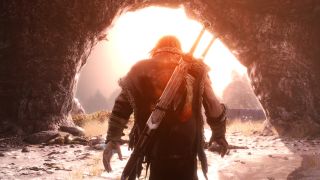
Phil Savage: A little bit of new
It's been a quietly inventive year, I think. Nothing too flashy, nothing too risky, but a lot of things going just slightly further than what came before. I think that's why I was so disappointed with Watch Dogs. When new consoles arrive, it's always nice to see developers try to implement new ideas and new approaches. Instead, a seemingly systemic game about toying with networks turned out to be a re-skin of past open-world ideas.
Luckily, the new ideas did come, and they were smuggled into otherwise derivative titles. Take Shadow of Mordor. I don't think it's an amazing game—I didn't vote for it in our Game of the Year awards—but the Nemesis System is one of the best new things to appear in an open word since Far Cry 3's Outposts. I would be perfectly happy to see it copied and iterated upon until we're all sick of it and desperate for the next idea to take hold.
What else? Alien: Isolation proved that smart, systems driven horror could find an audience. Plenty didn't take to it—the trial and error nature of a genuinely unpredictable monster going against what they want from a horror experience. That's fine; there are more than enough narrative horror games to serve those players. New ideas won't take hold of everybody. That Isolation resonated with as many people as it did proves that it can be worth taking the risk.
With Zeus, Arma 3 introduced one of the most interesting multiplayer modes of recent memory. With Endless Legend, Amplitude turned the expected model of a 4X game on its head. Even Call of Duty shook things up a bit—Advanced Warfare featuring a bunch of gadgets that were, dare I say it, fun. Staid genres are being slowly upended, and that can only be a good thing. Here's hoping the trend will continue after the new year.
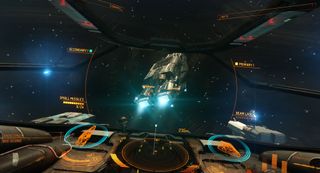
Chris Thursten: In space, everybody can appreciate excellent sound design
I’m always telling myself to remember composers and sound designers. Audio is, I think, the most under-appreciated aspect of game design—and often the easiest element to snip when your review is tumbling over an assigned word count. 2014 has been a phenomenal year for sound design in games. I realised this last night, while easing my Eagle into a docking bay in Elite: Dangerous. Everything about that routine interaction was made more evocative by Frontier’s fantastic work on the game’s audio: the resonant echo of the station’s central chamber, the reverberating thrum of passing ship engines, the heavy clunk of my own landing gear and the whirrs and beeps that accompany a connection to the station’s computer system.
Sounds communicate feeling far more readily than visuals, for me. Alien: Isolation was another example of this. Creative Assembly made audio integral to the game’s design, teaching you to listen for the differences in tone that denoted an alert xenomorph and a merely curious one. Likewise, the way that Amanda Ripley’s subtle grunts, gasps and whispers embody her in the world: the game achieves with sound and a few first-person animations what other games require a full third person perspective to pull off.
The same was true for the year’s other fantastic-feeling first person game, Wolfenstein: The New Order. While being Isolation’s tonal opposite, it achieves the same strong sense of a physical engagement with the world. B.J. Blazkowicz’s alarming facility with war is communicated through the chunka-chunka-chunka of those enormous shotguns, through the splatter of disintegrating Nazis and the sturm und drang of yet another enormous piece of masonry falling onto the hero’s head. I wrote a lot about the game this year, from reviewing it to looking back on it with its creative director. In both cases I felt the need to go the extra mile when describing how the game feels, and to a great extent that’s because it sounds so good. Points, too, for Machine Games fantastic, quixotic attention to detail when it comes to translating sixties pop into their Nazi-dominated alternate history versions.
Finally—and without spoiling anything—the years’ best dramatic beat in a game: the finale of Dragon Age: Inquisition’s ‘And Your Heart Shall Burn’ sequence. I won’t say much, but it’s a moment of drama and humanity communicated entirely through music, that brings together the game’s themes of survival, faith, doubt and perseverance in a moment that hinges entirely on the importance of song. It’s also about as close as we’ve gotten to a full-blown song-and-dance number in a game this year, and as such makes up for the terrible disappointment I feel about Assassin’s Creed: Unity not being a musical.
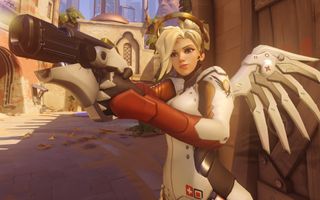
Evan Lahti: Overwatch your back
Blizzard did something completely new in 2014. Or maybe, actually, they just did what they’ve always done. Overwatch was the expected surprise at BlizzCon 2014, Blizzard’s first FPS and first truly new “intellectual property” (yuck, let’s just say “original game”) in seventeen years. But despite that, Overwatch matches Blizzard’s history of taking existing, popular games and polishing the hell out of them, also evident in its allegedly having taken five years to finish Hearthstone.
I liked Overwatch. I’ve got plenty of concerns about it, too (like whether its MOBA-like character and ability diversity will translate to a good competitive game). But what’s exciting to me as a multiplayer FPS guy is that Blizzard’s game is certain to create competition that we’ll benefit from. Battleborn, Gigantic, Project Bluestreak, and the new UT are all going to be competing for some of the same pool of players.
2014 was actually a dull year for FPSes, multiplayer and otherwise. CS:GO, as much as the recent December patch was terrific, didn’t have to do much to be the year’s most popular FPS. But Overwatch encourages me that 2015 will be a lot better, especially if everyone in the genre works a little harder to match Blizzard’s presentational craftsmanship, knack for competitive multiplayer, and ability to foster communities.

Tom Senior: All hail the omniplatform
More and more games are jumping the console/PC divide. Series once thought of as console, couch and arcade games are finding a happy niche on Steam. Metal Gear Rising: Revengeance, Metal Gear Solid V: Ground Zeroes, Phantom Pain, Final Fantasy XIII, Ikaruga, Street Fighter V, our open platform is gradually becoming the omniplatform it's always had the potential to be—a place where you can play anything.
There's still a long way to go. We won't see Nintendo games any time soon, and the occasional console exclusive bucks the trend (it's terribly sad to think we won't get Miyazaki's Bloodborne). We sometimes have to wait a while for big games like Grand Theft Auto V, too, but we're going in the right direction.
I hope one day Platinum bring their action games over, and we get a few more fighting games like Guilty Gear XRD. I want to play a beautiful HD version of Okami on my monitor. And Persona 4. I comfort myself with the knowledge that somewhere in a mirror universe, console-gamer Tom is sad he can't play Kerbal Space Program on his machine, or Eve Online, or Elite: Dangerous. He's got it much worse. Eat it, mirror-Tom!
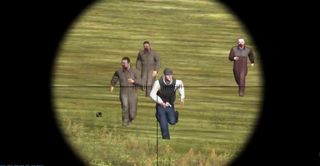
Samuel Roberts: The team that plays together...
I was trying to think of one big announcement that floored me in 2014, but there wasn’t one really. E3 was a bit weak and big publishers seem to either be sitting on their major announcement for next year, or they’re simply not making as many games. So, the best things that happened to me in PC gaming this year were all down to the games themselves: South Park, Alien, Titanfall... but we’ve discussed these elsewhere. So here’s something more specific and cool that ignited my excitement for PC this year.
Some of the best fun I had in 2014 was playing Bohemia games with the PCG team—specifically DayZ in January and Arma 3 in the summer. In DayZ, we were mercilessly hunted by a bloodthirsty internet, who worked out what server we were on and streamsniped us. Escaping from that lot to make a desperate last stand was really fun, and showed how much fun DayZ is even in a rough state. Bohemia’s survival sandbox had a pretty amazing year, selling over 2.7 million copies and counting.
I’ll wait for some major content additions before I return to Chernarus because after about 30 hours playing it in a month, I burned out a bit, but even right now there’s a good time to be had. Discussing DayZ tends to invite negative comments about how slow development is going on the game, but it’s well worth playing if you’ve never given it a go before.
In Arma 3, we sampled the revolutionary on-the-fly set piece-creating multiplayer mode, Zeus. Andy Kelly was playing the role of god while we all scrambled around on the ground, unsure of what challenges he’d set us next—he bombarded us with weather, paratroopers, deadly military aircraft, landmines and of course thunderbolts, all in the name of entertainment. I recommend trying it with a group of friends and letting the most batshit person play god.

Wesley Fenlon: Falling head over heels for the Crescent Bay
Nothing I experienced in gaming this year came close to the seven minutes I spent wearing the Oculus Rift Crescent Bay prototype. A year ago, I was sure the consumer Oculus Rift headset would be out by the end of 2014. Oculus still hasn't even hinted at a consumer release date. But the amazing thing about Crescent Bay is that it's actually better than I expected the first consumer model to be, and Oculus still isn't satisfied with it.
The screen is higher-res than I expected for the first consumer model. The headset is lighter and more comfortable. I didn't even consider the possibility of integrated audio. It's really, really exciting that a prototype has all of those features, and the eventual consumer model will only be better and more polished.
But like Oculus says, it's really the experience, not the tech specs, that makes virtual reality special. And the improvements Oculus made over DK2 create a dramatic, immediate sense of "presence" or immersion in Crescent Bay's demos. When I stood on the edge of a virtual skyscraper and felt my body instinctively resist stepping over the edge, I knew this was what true VR was capable of. Everything else had just been a warm-up.
I don't know what Oculus has in store for the Consumer Electronics Show this January, but it stands a good chance of being my highlight of 2015.
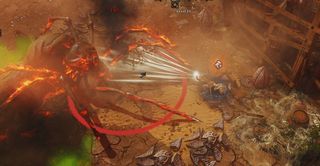
Tom Marks: Committing to Original Sin with my significant other
It’s weird to think I’ve been playing Divinity: Original Sin nearly every weekend for the last six months, let alone with the same person. When I first got it, my girlfriend and I decided we were going to play through entirely in co-op with each other—the whole 100 hour storyline. At the time, it sounded like the type of commitment that would either never be finished or end with us breaking up. But 90 hours of gameplay later, we are entering the final dungeon and moving in together at the start of January. It may sound cheesy, but we are going into the last leg of the game while preparing to leave our actual homes.
There were moments when setting aside time to play felt more like a task than a joy, but I have no doubt that if I had played it on my own I would’ve stopped at least 40 hours ago. Not because of the quality of the game, but because it is simply my nature. I commit that all too common sin of not beating most of the games I buy, so knowing my lazy unwillingness to keep soldiering on wouldn’t just affect me this time was a hugely motivating force. Playing a game this way, especially a story-heavy RPG, has been an incredibly unique and rewarding experience. It’s a challenge I highly recommend to anyone who has another person willing to stay onboard for the long haul. I definitely plan to repeat the experience in 2015. The question is, which game?

Tim Clark: Stealing the dream
It stands to reason that having banged on about Hearthstone all year, I’m not about to stop now. I could pick plenty of highs: The month-long party that was the Curse of Naxxramas rollout. Tooling around with the new Goblins Vs. Gnomes cards for the first time at Blizzcon. Tom pulling me a Golden Mal’Ganis out of the first few packs. Hitting rank 5 for the first time (and likely last, judging on current performance).
I could also add a ton of lows, the deepest of which was undoubtedly the time I had exact lethal on board having been on 2 health for the three previous turns hiding behind Taunts, and decided to go for the BM play, beginning by casting Swipe on my opponent’s face, only to kill his Leper Gnome and deal 2 damage to myself. Shiprekt, mate.
Still, the good times have undoubtedly felt better than even the saltiest low. I think I'm addicted to the rush that comes with winning now, moreso than in any other competitive game I've played, and regardless of how reliant on RNG my victories actually are.
My ultimate win was the time I was playing Priest, and miles behind on board (again, in case you aren’t spotting the pattern) against a Paladin. I cast a YOLO Thoughtsteal which nabbed Equality and Wild Pyromancer. Next step: Profit.
I let him overextend by a couple more minions then dropped his own board clear combo against him. It took a second for him to realise what had happened, and then another to hit the concede button. I ran around the living room holding the laptop aloft like a Kalashnikov being fired into the sky.
And that, pretty much, is why Blizzard has added more RNG to Hearthstone, not less. When it’s good, it’s so good.

Shaun Prescott: Early Access is actually pretty cool, okay?
There’s a lot of griping about Early Access. I don’t understand it. Steam clearly marks all Early Access games, and some developers go to extra lengths to ensure a game’s status is abundantly clear. There’s undoubtedly good arguments against the phenomenon, but for anyone actively interested in both games and game development there have been some great projects to keep abreast of this year.
Is it possible to exploit the model? Yes, probably. But I’ve found watching the evolution of DayZ, Rust and Screencheat incredibly rewarding. Getting onboard an Early Access project you really care about is a reminder that development is an extraordinarily delicate undertaking. I’ve found it satisfying because, at a time when the internet feels like a bulging catalogue of consumer outrage, this seems to bring communities together in a way that’s unique to both games and the internet. (It also makes people very angry too, but y’know, that’s also the internet for you).
It’s easy to forget that games are a complicated meeting of many different artistic pursuits, rather than a humble product you buy discounted on Steam and then probably forget about. Early Access, when done right, and handled well by the project leads, brings back a curiosity I’ve not really felt since observing the Doom modding community back in the ‘90s. The opportunity to draw back the curtain and see how the systems behind games work is endlessly fascinating to me, as someone lacking the skills to do it myself. It also comes with the added bonus of funding strange ideas that no major publisher would touch with a ten foot zombie stake (until the bravery of indies prove them effective, of course).

PC Gamer is the global authority on PC games—starting in 1993 with the magazine, and then in 2010 with this website you're currently reading. We have writers across the US, Canada, UK and Australia, who you can read about here.

Final Fantasy 7 Remake patch levels everyone up and lets you speed up cutscenes to help you replay it before Rebirth comes to PC

In a sea of Game Awards announcements, you probably missed the debut trailer for Covenant, a gnarly 'FPS Soulslike' from veteran shooter devs looking to 'provide more than what seems possible for the price'

Final Fantasy 7 Remake patch levels everyone up and lets you speed up cutscenes to help you replay it before Rebirth comes to PC

In a sea of Game Awards announcements, you probably missed the debut trailer for Covenant, a gnarly 'FPS Soulslike' from veteran shooter devs looking to 'provide more than what seems possible for the price'
Most Popular




